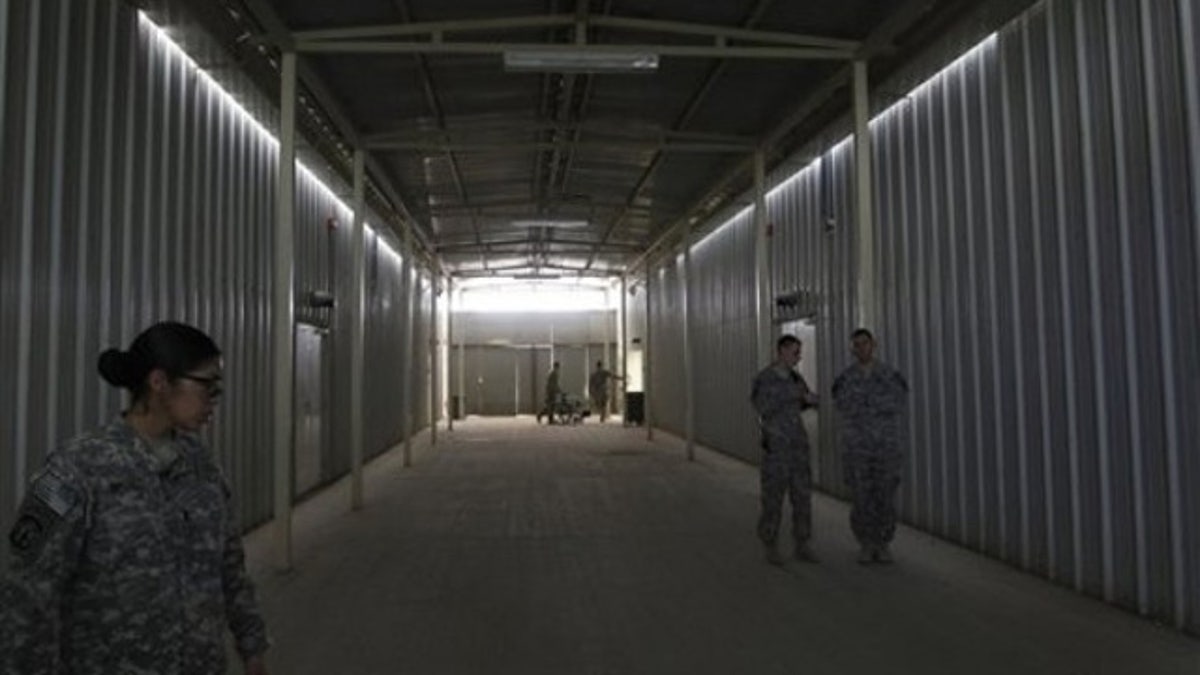
Aug. 27: U.S. soldiers stand outside cells at a newly built U.S.-run Parwan Detention Facility in Bagram north of Kabul, Afghanistan. (AP)
The U.S. military is likely to retain control of a portion of its prison here even after it hands formal responsibility to the Afghan government next year, according to the top American admiral in charge of U.S. detention operations in Afghanistan.
The move is a bid to prevent the release of detainees who could pose a danger to allied troops, said Vice Admiral Robert Harward. Such a carve-out could also be used to hold accused terrorists captured far from the battlefields of Afghanistan, according to U.S. officials.
The detention facility at Bagram Air Field is the only permanent U.S. prison in Afghanistan, and is a central piece in U.S. counterterrorism efforts in the region. As the administration of President Barack Obama works to close the Guantanamo Bay prison, the U.S. currently doesn't have a facility to hold suspects captured in countries where it fears they may not be held securely.
Bagram prison is one of the first security institutions Kabul will take over as part of the White House strategy of giving security responsibility to Afghanistan, and its handover will mark a crucial first test of the U.S. strategy. It will also be a critical milestone for the Afghan government, which doesn't want significant numbers of its citizens in U.S. military custody.
The handover is complicated by another Obama administration imperative: retaining a secure facility where it can send suspected terrorists captured in places such as Yemen or Somalia. Early in the Afghanistan war, a handful of prisoners from outside Afghanistan were brought to Bagram, but no such detainees have been brought here under the Obama administration.
Adm. Harward, the commander of Task Force 435, which oversees the prison, says a small number of prisoners will likely remain in U.S. custody after the handover. The U.S. would retain control of one of the hangar-like buildings where prisoners are held, U.S. officials say, adding they anticipate holding fewer than 100 detainees.
Afghan lawmakers haven't commented on the prospects of a such a carve-out, but have said they don't want non-Afghan prisoners transferred to the prison from Guantanamo. U.S. officials have said there are no plans to move non-Afghan detainees here from Guantanamo.
Adm. Harward said he hopes to make the handoff between March and June 2011. The timeline will be based the capacity of the Afghan justice system and training of the corrections officials.
"I anticipate having a subset of unilateral U.S. detention operations, including Pakistanis we can't repatriate and enduring security threats," he said.
Of the approximately 1,100 detainees currently in the prison, Adm. Harward estimates about 60% of the cases have strong evidence that can be presented in Afghan courts. The remainder are being held on the basis of classified intelligence that the U.S. can't, or won't, submit to an Afghan court. For these detainees, the U.S. lacks the direct eyewitness accounts that would bring an easy conviction in an Afghan courts.
Such detainees could be signed over to Afghanistan, released or held in U.S. custody as a "continuing security threat," Adm. Harward said. In the Iraq war, thousands of prisoners were handed over to the central government in Baghdad, which ultimately released most of them.
Transferring suspected terrorists to Bagram from outside Afghanistan would require the approval of Afghan President Hamid Karzai. A senior U.S. official said a final decision on whether to use the prison to hold such prisoners wouldn't be made until the administration is confronted with an actual case.
To help build support for the handover, the U.S. military's detainee task force has been giving Afghan lawmakers tours of the facility, where detainees are held communally in large cages inside several detention buildings.
On one recent visit, the Afghan lawmakers were handed eyeglasses to protect them if the detainees threw feces. Detainees appeared more interested in pleading their case to the visitors than assaulting them.
Click here to read more on this story from The Wall Street Journal.
